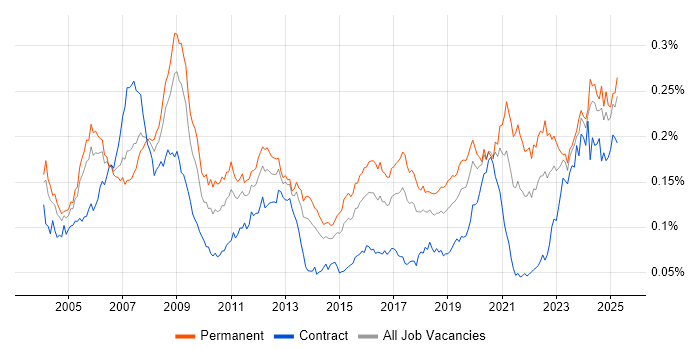Field-Programmable Gate Array (FPGA)
UK
The table below looks at the prevalence of the term FPGA in permanent job vacancies. Included is a benchmarking guide to the salaries offered in vacancies that cited FPGA over the 6 months leading up to 4 March 2026, comparing them to the same period in the previous two years.
| 6 months to 4 Mar 2026 |
Same period 2025 | Same period 2024 | |
|---|---|---|---|
| Rank | 534 | 526 | 628 |
| Rank change year-on-year | -8 | +102 | +147 |
| Permanent jobs citing FPGA | 141 | 160 | 196 |
| As % of all permanent jobs in the UK | 0.20% | 0.35% | 0.25% |
| As % of the Miscellaneous category | 0.62% | 0.91% | 0.69% |
| Number of salaries quoted | 57 | 53 | 141 |
| 10th Percentile | £51,250 | £45,500 | £37,500 |
| 25th Percentile | £55,000 | £50,000 | £43,750 |
| Median annual salary (50th Percentile) | £65,000 | £60,000 | £52,500 |
| Median % change year-on-year | +8.33% | +14.29% | - |
| 75th Percentile | £71,250 | £66,250 | £67,500 |
| 90th Percentile | £85,000 | £76,000 | £100,000 |
| UK excluding London median annual salary | £65,000 | £56,000 | £50,000 |
| % change year-on-year | +16.07% | +12.00% | -4.76% |
All Generic Skills
UK
FPGA falls under the General and Transferable Skills category. For comparison with the information above, the following table provides summary statistics for all permanent job vacancies requiring generic IT skills.
| Permanent vacancies with a requirement for generic IT skills | 22,565 | 17,526 | 28,558 |
| As % of all permanent jobs advertised in the UK | 31.66% | 38.46% | 36.30% |
| Number of salaries quoted | 11,422 | 8,571 | 20,511 |
| 10th Percentile | £28,500 | £32,750 | £28,500 |
| 25th Percentile | £37,500 | £46,250 | £39,250 |
| Median annual salary (50th Percentile) | £55,000 | £61,644 | £55,000 |
| Median % change year-on-year | -10.78% | +12.08% | -15.38% |
| 75th Percentile | £78,750 | £83,750 | £77,500 |
| 90th Percentile | £100,000 | £113,500 | £98,750 |
| UK excluding London median annual salary | £48,500 | £55,000 | £50,000 |
| % change year-on-year | -11.82% | +10.00% | -9.09% |
FPGA
Job Vacancy Trend
Historical trend showing the proportion of permanent IT job postings citing FPGA relative to all permanent IT jobs advertised.

FPGA
Salary Trend
Salary distribution trend for jobs in the UK citing FPGA.

FPGA
Salary Histogram
Salary distribution for jobs citing FPGA over the 6 months to 4 March 2026.
FPGA
Top 16 Job Locations
The table below looks at the demand and provides a guide to the median salaries quoted in IT jobs citing FPGA within the UK over the 6 months to 4 March 2026. The 'Rank Change' column provides an indication of the change in demand within each location based on the same 6 month period last year.
| Location | Rank Change on Same Period Last Year |
Matching Permanent IT Job Ads |
Median Salary Past 6 Months |
Median Salary % Change on Same Period Last Year |
Live Jobs |
|---|---|---|---|---|---|
| UK excluding London | -17 | 109 | £65,000 | +16.07% | 153 |
| England | -64 | 107 | £65,000 | +8.33% | 150 |
| Work from Home | +24 | 74 | £67,500 | +35.00% | 62 |
| South West | -3 | 23 | £65,000 | +8.33% | 29 |
| London | +25 | 22 | £150,000 | +31.87% | 22 |
| East of England | -11 | 20 | £72,500 | +38.10% | 31 |
| South East | -51 | 18 | £60,000 | -4.00% | 57 |
| North of England | -28 | 16 | - | - | 8 |
| Wales | +4 | 12 | £57,500 | +4.55% | 2 |
| Scotland | +2 | 10 | £67,500 | +12.50% | 18 |
| North West | -9 | 8 | - | - | 2 |
| Yorkshire | -30 | 8 | - | - | 5 |
| Midlands | -8 | 7 | £52,500 | +5.00% | 12 |
| West Midlands | - | 6 | £52,500 | - | 2 |
| Northern Ireland | - | 3 | - | - | 4 |
| East Midlands | -33 | 1 | - | - | 10 |
FPGA
Co-Occurring Skills & Capabilities by Category
The following tables expand on the one above by listing co-occurrences grouped by category. They cover the same employment type, locality and period, with up to 20 co-occurrences shown in each category:
|
|
|||||||||||||||||||||||||||||||||||||||||||||||||||||||||||||||||||||||||||||||||||||||||||||||||||||||||||||||
|
|
|||||||||||||||||||||||||||||||||||||||||||||||||||||||||||||||||||||||||||||||||||||||||||||||||||||||||||||||
|
|
|||||||||||||||||||||||||||||||||||||||||||||||||||||||||||||||||||||||||||||||||||||||||||||||||||||||||||||||
|
|
|||||||||||||||||||||||||||||||||||||||||||||||||||||||||||||||||||||||||||||||||||||||||||||||||||||||||||||||
|
|
|||||||||||||||||||||||||||||||||||||||||||||||||||||||||||||||||||||||||||||||||||||||||||||||||||||||||||||||
|
|
|||||||||||||||||||||||||||||||||||||||||||||||||||||||||||||||||||||||||||||||||||||||||||||||||||||||||||||||
|
|
|||||||||||||||||||||||||||||||||||||||||||||||||||||||||||||||||||||||||||||||||||||||||||||||||||||||||||||||
|
|
|||||||||||||||||||||||||||||||||||||||||||||||||||||||||||||||||||||||||||||||||||||||||||||||||||||||||||||||
|
|
|||||||||||||||||||||||||||||||||||||||||||||||||||||||||||||||||||||||||||||||||||||||||||||||||||||||||||||||
